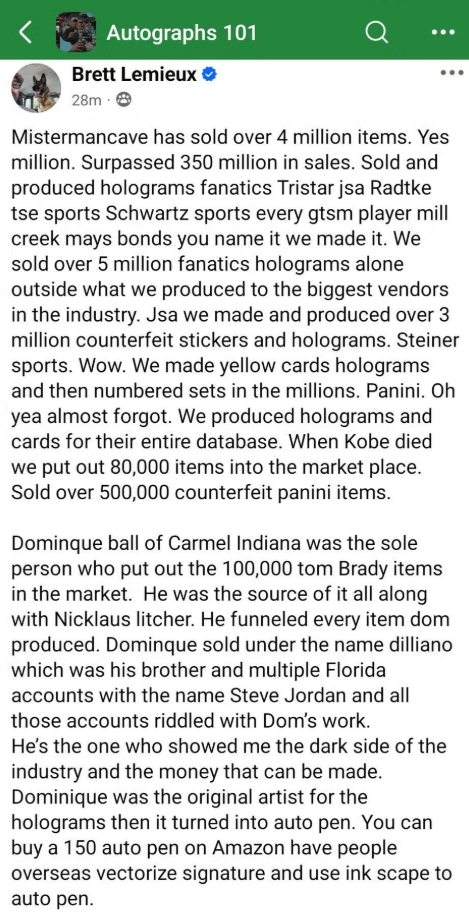The serene backdrop of Westfield, Indiana, recently became the unlikely stage for an electrifying scandal that has thrown the sports collectibles world into a maelstrom of doubt and reevaluation. This isn’t your typical detective story, yet it is one with the allure of complex intrigue, tragic consequences, and a web of falsities worthy of a thriller series. At its core sits Brett Lemieux, an autograph dealer whose name will now be etched, albeit ignominiously, in the annals of sports memorabilia history.
Lemieux, at 45, found himself at the heart of a multi-million dollar quagmire of counterfeit memorabilia. As authorities descended on his operation, Lemieux met a tragic end before a whirling vortex of holograms, forged signatures, and shattered dreams. While the exact cause of Lemieux’s death is still under the forensic gaze of the Hamilton County Coroner, the whispers from Westfield’s law enforcement attribute it to a self-inflicted gunshot wound—a grim conclusion as officers moved in during a painstaking search warrant execution in connection with this grand-scale deception.
This startling enterprise first made waves when a digital confession, purportedly authored by Lemieux, appeared in the digital confines of the “Autographs 101” Facebook group. It was a startling admission, a theatrical revealing of the man behind the curtain of a market-altering faience of fakery. Lemieux claimed to have floated a staggering four million counterfeit items into circulation—an astonishing assertion that pegged his existential deception at a jaw-dropping $350 million.
What’s more astonishing, perhaps, is the subtlety with which Mr. Lemieux, operating under the inconspicuous guise of though through social media as “Mister Mancave,” infiltrated the market. His business boasted “the largest framed jersey inventory on the web” but was shadowy enough to elude physical specificity—an operation registered, dissolved, and reincarnated multiple times within Indiana’s bounds across half a decade.
The underworld Lemieux narrated specialized in high-wire acts of forgery, focusing on those glimmering authenticity hologram stickers—tools of trust placed by top authentication brands such as Panini, Fanatics, Tri-Star, and others. Curiously, Lemieux’s tale took a darker turn when he referenced the posthumous exploitation of basketball icon Kobe Bryant, suggesting that, after Bryant’s untimely demise, as many as 80,000 fake memoranda bearing Bryant’s signature unexpectedly found their way into unwitting hands.
This wasn’t just limited to the hoops realm. A seemingly authentic Aaron Judge–signed baseball flaunting a Fanatics hologram was priced alluringly at $399 on Lemieux’s website—quite the bargain next to Fanatics’ own legitimate price tag of $699. How did such deals evade detection, one might hastily inquire? The intoxicating allure of authenticity, shielded by the shroud of duplicated stickers, offered a veil of legitimacy that, until now, was rarely torn aside.
Collectively, the scandal has catalyzed earnest conversations in the memorabilia milieu. Fanatics, acting preemptively two years prior, undertook sizable enhancements to their hologram technologies. Yet despite brisk securitization efforts evocative of espionage behaviors—complete with ex-FBI expert consultations—there remains a sense of vulnerability exposed by recent events.
Skeptics—sharp-eyed as ever—scrutinize the grandiose financial figures cited in Lemieux’s contrition. $350 million conjures visions of trapped disbelief. However, the indelible wound on the marketplace is palpable. Steve Grad, an autograph luminary, highlights the almost alchemic complexity of detecting fraudulent signatures, stressing that modern, sophisticated methods make uncovering forgeries a herculean task indeed.
For those within the industry, the revelation has acted as both an unpleasant surprise and a bitter confirmation long suspected. Lemieux was noted for possessing signatures of athletes virtually absent from the public domain for years. And as stones turned, names emerged—associates such as Indiana dealer Dominique Ball and Wisconsin’s Nickolas Litscher, each denying any complicit involvement with indignation and legal ramifications.
Authorities trace threads leading to several enterprises—Ultimate Sports, Athletes One, Signature Dog, and All-American Authentics—indicating a wider network metaphorically akin to a hydra-headed forgery apparatus.
So here we are, amid the swirling fracas of discovery and disbelief. Collectors around the globe find themselves suddenly grasping at straws or, in this case, jerseys, balls, and cards, now shadowed by authenticity’s question mark. The scandal is an undeniable clarion call echoing through the sports collectibles community, reminding all that in the game of collect, authenticate, and rejoice—eternal vigilance remains the most crucial player on the field.

